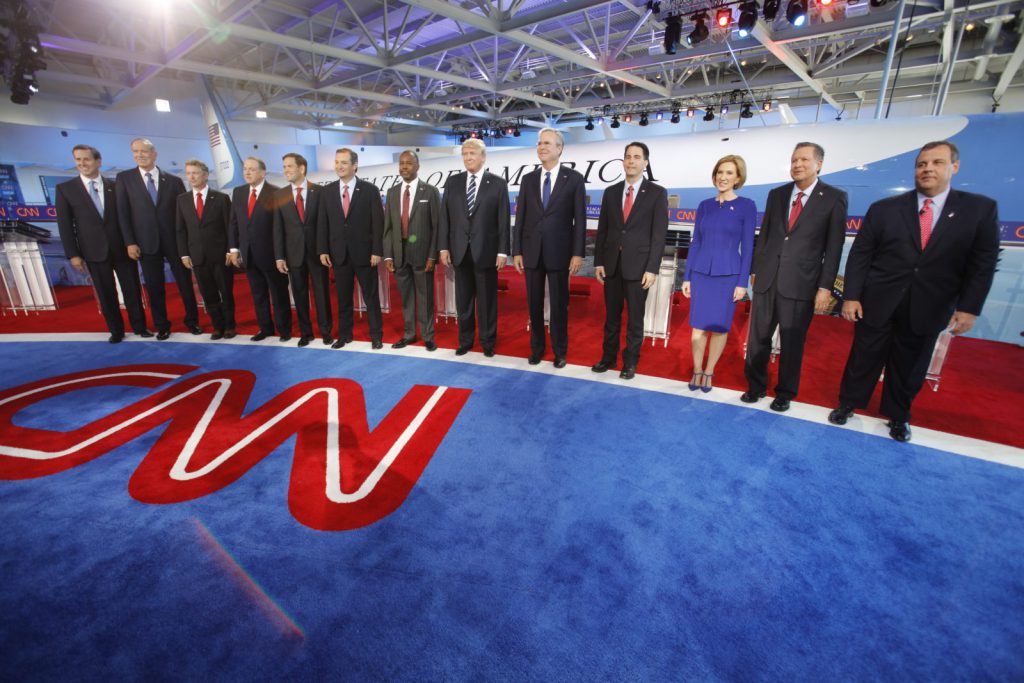
Published November 5, 2015
The questions posed by the moderators (and the manner in which they were asked) at the latest debate among the candidates seeking the GOP nomination for president have come under heavy criticism, both during the debate itself and in the days since it was held. While the debate had some interesting moments, by and large it was as disappointing as the previous two because of its emphasis on encouraging personal attacks among the participants and on minor matters rather than issues of real consequence.
It’s a shame things have gone this way in the debates so far, but it’s not too late to change course, as my American Enterprise Institute colleague Michael Strain has argued. There’s another debate next Tuesday, and it would be good if the candidates were given the chance to actually discuss the many important substantive disagreements among them. Because, although you wouldn’t know it from the news coverage, many of the candidates have released actual policy plans in recent weeks and months, on everything from taxes and entitlements and the federal budget to closing the Department of Commerce. There’s plenty of material in those plans to generate a lively two-hour discussion among the candidates about where exactly they would like to lead the country. Here are just a few of the important issues raised by the candidates’ official proposals that might generate interesting and enlightening exchanges.
Should the GOP embrace a European-style VAT? Republicans have been calling for tax reform for many years. To their credit, both Ted Cruz and Rand Paul have offered specific ideas for replacing today’s personal and corporate income-tax structures, as well as payroll taxes, with alternative revenue-generating sources. The centerpiece of each of their plans is a version of the flat tax, but both also propose to replace the corporate income- and payroll-tax systems with a business transfer tax — otherwise known as a Value Added Tax, or VAT. The tax is paid by businesses on the basis of economic transactions, but it is effectively a tax on the consumption of goods and services by individuals.
Many other countries have adopted a VAT, because it generates substantial revenue with much less political friction than an income tax. Individual taxpayers are less aware of what a VAT costs them because they don’t pay it directly, although it affects the prices of the products they consume. Conservatives in the United States have generally opposed adopting a VAT for this very reason: It’s just too easy for liberals, when they are in power, to raise taxes without consequence by tweaking the VAT.
Senators Cruz and Paul are known as strong advocates for limited government, which makes their embrace of a VAT surprising, as noted recently by Chris Edwards. They should be given time to explain their positions, and the other candidates should be given time to rebut them, if in fact they disagree about adopting a VAT.
Should the GOP embrace eliminating the tax preference for employer-based health insurance? In 2008, the GOP nominee for president, Senator John McCain, proposed eliminating the tax preference for employer-paid health-insurance premiums and replacing it with a universal tax credit that would be available to all households, regardless of whether someone in them worked or not. McCain’s proposal was more progressive than current law because the tax credit is far more valuable for lower-income households than an exclusion of employer-paid premiums from income and payroll taxes. Nonetheless, then-senator Barack Obama attacked the McCain plan relentlessly as the beginning of the end of employer-based coverage, which is the source of insurance for about 160 million Americans. These attacks were very effective.
This year, most (but not all) of the candidates have called for repealing Obamacare and replacing it with an alternative plan, but the plans released to date differ in important ways on how they would treat employer-based health plans. Governor Bobby Jindal of Louisiana has proposed replacing the current tax preference with a new, standard deduction that could be used for premiums paid for employer coverage or for plans bought in the individual insurance market. Senator Marco Rubio of Florida proposes a ten-year transition, at the end of which the tax break for getting employer coverage and the one for buying insurance in the individual market would be equalized (although crucial details on how this would work have yet to be released). Former Florida governor Jeb Bush proposes to retain the current tax preference for employer plans, but with an upper limit to encourage cost discipline.
These candidates, and the others on the stage, should be given the chance to present their competing ideas, and in particular to explain how they would defend their plans against the Democratic attacks that will predictably come their way.
Should the GOP embrace premium support for Medicare? In 2009, House Republicans, led by Paul Ryan, began championing reform of Medicare to slow the pace of cost escalation in the program. The main idea was to move Medicare toward a “premium support” model. Under premium support, Medicare beneficiaries would choose from among competing health-insurance options every year. They would get a fixed level of government support to offset a portion of their premium, and pay whatever is not covered by the government out of their own pockets. Thus, if they choose a low-cost option, it reduces their own costs. And vice versa for more expensive plans. The traditional Medicare program, run by the federal government, would be one of the options beneficiaries could select.
Premium support has been embraced by many in the GOP because it would inject consumer choice and market incentives into Medicare, which is what many conservatives believe is the answer to rising costs.
In 2012, with Ryan as the vice-presidential nominee, the GOP more or less embraced premium support as its official policy.
In this cycle, Bush, Rubio, and Jindal (who was instrumental in crafting the original “premium support” reform plan as executive director of a bipartisan commission in 1999) have all supported moving Medicare toward a premium-support model. Governor John Kasich of Ohio released a reform plan that specifically omits reference to premium support. He instead advocates changing Medicare’s payments to providers to “increase value and quality.” It is unclear where the other candidates stand on this issue.
High and rising health-care costs are the source of many of the nation’s ongoing fiscal problems. It will not be possible to cut taxes, or even hold the line on them, if Medicare spending rises as rapidly in the future as it has in the past. The candidates should be asked to explain why they believe premium support is part of the solution, or, if they do not accept that approach to reform, what they would do instead, and why.
Can the GOP secure large tax cuts with no spending restraint? All of the GOP candidates profess to be concerned about mounting government debt, but very little time has been spent in the debates discussing what exactly they would do about the problem. Moreover, several of them favor tax plans that would reduce federal revenue by trillions of dollars over the coming decade. The only possible way to advance such a tax cut would be in the context of a fiscal plan with considerable spending restraint.
To date, Chris Christie, Kasich, Rubio, and Bush have offered plans that advance some specific ideas for spending reductions, but only Kasich has offered something that might be described as a full budget plan (even if many important details are still missing). Christie, Rubio, and Bush have offered plans that would clearly slow rising entitlement spending over the medium and long term through adjustments in Social Security and Medicare, but even these candidates have yet to say much about how they would keep debt from spiraling out of control over the next decade.
The others — most notably Donald Trump, Ben Carson, and Cruz — have said virtually nothing on spending restraint beyond generalities that mean nothing.
It would be useful in the next debate if the candidates, especially those pushing for big reductions in federal revenue, were asked to explain what exactly they would do on the spending side of the budget to prevent a massive escalation of federal debt.
The first voting in the 2016 presidential race will take place in about three months, and polling indicates that the vast majority of voters haven’t made up their minds about which candidate they plan to support. They are starting to pay attention, however, and so now would be a good time to have a substantive debate on issues that matter rather than another one dominated by trivialities and unsupported and implausible candidate assertions.
— James C. Capretta is a senior fellow at the Ethics and Public Policy Center and a visiting fellow at the American Enterprise Institute.






